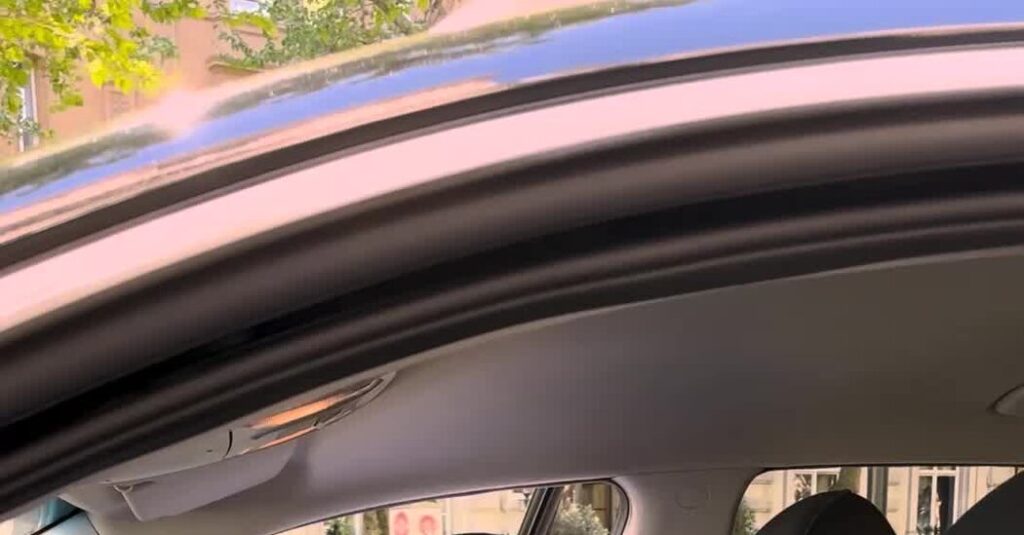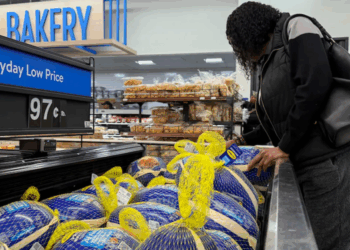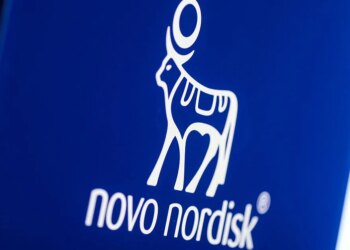Besart Bilalli scanned the road through the windshield on a sunny Friday, thinking hard about his next turn. We were crawling down a busy London road in the upscale Knightsbridge neighborhood as drivers and cyclists shot past, their phones hoisted up on dashboards or handlebars.
Mr. Bilalli’s phone lay idle next to him, the GPS switched off. In this city, navigating the streets without technological help is essential to becoming a cabdriver. And for Mr. Bilalli, a key to his family’s future.
He was taking us from the Nusr-Et Steakhouse to the La Famiglia Italian restaurant on Langton Street and avoiding the main roads, relying only on his memory of the neighborhood.
In the back seat, I discreetly typed the destination into my phone and saw we were two miles away. Mr. Bilalli peered at signs, murmuring street names under his breath. Fifteen minutes later, having encountered zero lights, we pulled up in front of La Famiglia. He exhaled.
It was his first time driving the route and he felt confident now that it was embossed in his memory.
Mr. Bilalli, an aspiring London black-cab driver, was practicing for what is called the Knowledge, the grueling examination that requires applicants to essentially memorize more than 100 square miles of city streets. Some test takers are asked, late in the process, to describe a route that avoids certain roads, so they prepare accordingly. Hundreds of people still apply each year, and the notoriously difficult testing regimen can take three years, if not longer, to complete.
Mr. Bilalli, 39, had compelling reasons to take on the Knowledge. A decade into driving for Uber, Mr. Bilalli had grown frustrated with his dependency on the app and what he regarded as Uber’s excessive commissions. He had three children, and he worried that the money he earned wasn’t enough to supplement his wife’s income as a teacher’s assistant. He felt he could do better as an independent black-cab driver.
“It has come the time to move on, to upgrade to something better,” Mr. Bilalli said in an interview. It was May, two years into his quest. He kept a strict schedule of studying by day, driving with Uber by night and spending what precious time remained with his children.
He was determined, he said, to set himself and his family up for a new, more stable future.
A Game of Snakes and Ladders
The first time he tried to pass the Knowledge, Mr. Bilalli gave up. His children were young and he was stressed about the family finances while trying to study. He turned to Uber to make a living, clocking long hours on London’s roads.
After a decade, his wife, Dafina, encouraged him to try again. Their children — Gerti, 15, Morena, 11, and Irisa, 7 — were more independent. The Bilallis agreed to struggle for a little while, as long as they covered their bills.
Mr. Bilalli signed up for classes at a school teaching the Knowledge and mounted a map of London’s streets in his home. From a distance, the map is a spaghetti-sprawl of yellow, with what looks like a blue snake representing the River Thames. Up close, it sharpens into street names, parks and more: a daunting set of data laying out a major metropolis.
“It’s like a puzzle,” Mr. Bilalli said, tracing streets with a black marker in one hand. “We have to get as straight a line as possible.” We were at the Knowledge Point School in West London, where he spends up to eight hours a day drilling practice questions from an iPad. He was wearing an outfit favored by fathers everywhere: jeans, sneakers and a puffy vest.
He had a way of speaking that was polite and frank. I could imagine him as a driver sitting calmly in traffic, content making conversation with his passengers or letting silences stretch on. He was still driving part time for Uber when he could.
“Even when I get riders on Uber, I do not use the map,” he said. “That’s when I realized that, oh, yeah, I could be doing this job.”
More than 150 years after it was created to train cabmen in horse-drawn carriages, the Knowledge still covers roughly the same area: a six-mile radius of the city surrounding Charing Cross, including some 25,000 streets and 6,000 points of interest.
Aspiring drivers must first pass a multiple-choice exam about those landmarks and 320 set routes. Studying for this can consume two years. Only then do applicants get to arguably the hardest part: a series of oral tests at London’s transport authority office in which they must recite the shortest route between two points. Some students take three years or longer to complete the process.
Successful candidates receive an oval badge with their cabdriver number and the opportunity to pick up passengers. How much the drivers make varies — some in London have reported to the job-seeking site Indeed that they earn around 50,000 British pounds a year, while others say it’s possible to earn into six figures.
But the testing process can feel like playing a real-life game of Snakes and Ladders. Failing too many appearances means repeating the entire stage, a horror known as redlining that can set students back months. The whole process can cost more than 1,000 pounds, but many students say the biggest financial burden is the study time that could be spent making money in other ways.
There are concerns that this ordeal, along with other disruptions, poses an existential threat to the London taxi trade. Ten years ago, there were over 21,000 black-cab drivers in the city, according to Transport for London, the city’s transportation authority. Today, the number is about 15,000. During the same period, the number of people driving for Uber, Bolt and other services — all tightly tethered to their GPS apps — has jumped from about 78,500 to about 106,000.
During the Covid lockdown, the number of new students dipped to fewer than 200 a year. But now it is climbing again: more than 600 people have applied this year to take the Knowledge, and about twice as many were in the process as of September, according to the transport authority.
Katie Chennells, who oversees the exam process for the authority, told me that the Knowledge helps drivers provide “a high-quality service.” It gives them the ability to offer recommendations to passengers and deal with stressors like road closures. And the cabs, unlike some other vehicles, accommodate people with accessibility needs. She likened ride-sharing services to budget lodging and black cabs to a five-star hotel.
“People, they just trust us on a different level to which they trust a lot of other drivers,” she said. (A spokeswoman for Uber said in a statement, “We are proud that thousands of drivers continue to make the positive choice to work on Uber as passenger demand and trips continue to grow.”)
Most days, after dropping his children off at school, Mr. Bilalli heads straight to Knowledge Point. To simulate the pressure of the tests, Gert Kretov, the cabdriver who runs the school, calls students to the front of the class one by one and quizzes them.
One evening, he asked Mr. Bilalli to describe how he would take someone from Catford Bridge Station to Bermondsey Wall East. Mr. Bilalli frowned and looked at the floor. He didn’t know the directions well, but launched into an answer, knowing that hesitating could cost him points. Other students in the class closed their eyes, their lips moving. They were trying to envision it with him.
Mr. Kretov, who has a no-nonsense teaching style, tells his students to get used to the discomfort of being put on the spot. Oracle-like at times, he prophesied that only by putting in the work will the Knowledge be “within them.”
‘The Pressure Is Crazy’
Riding with Mr. Bilalli in his Kia one afternoon, I began to appreciate the all-consuming nature of this Sisyphean undertaking. We passed museums, members’ clubs, luxury hotels, affordable hotels, embassies, theaters and police stations, and he called out each one with practiced ease, never once looking at his GPS.
“It sticks, because the roads we already know,” he said. “It’s just how you remember to connect them.”
It would be easy, he said, to mix up places like the Athenaeum Hotel, a luxury hotel near Piccadilly, with the Athenaeum, a private members’ club about a mile away. But on days when directions fall easily from his lips, Mr. Bilalli feels close to his dream. “Wow,” he thinks, “I’m flying.”
Then there are the times, like one painful appearance at the transit office, when he fumbled a question about driving from Citadines Trafalgar Square, a hotel, to Ladbroke Grove in West London. Mr. Bilalli knew the route, but he mistook which side of the street the hotel is on.
If he botched more questions in his next two appearances, he would redline and have to retake the segment — much of a year lost.
“The pressure is crazy,” he said. He had slept badly before the test. His wife wakes him to tell him that he has been mumbling directions in his sleep. Their bedroom is cluttered with a large map of the city, books on the Knowledge and scrawled sticky notes on how to get to and from one place to the next. Sometimes, the notes slip behind the bed.
And there is never enough time with his children, who ask him when he leaves home: Is he heading out to drive the streets or to study the streets?
It was hard to explain to his 7-year-old, who brings him the sticky notes she finds around the house, that he would miss yet another summer trip to see their relatives in his native Kosovo. Instead he was with his classmates at Knowledge Point, worried he would fall behind if he took time off.
But he thinks his son Gerti, who is older, could understand. Mr. Bilalli tells him he wasn’t able to attend higher education because he had to move to a different country and learn a new language. He tells Gerti that he, too, will have to apply himself in class.
“This is for me the highest thing that I can do,” he said. “It’s the Knowledge. I’m trying to do something. To have it for my future — for the rest of my life, whatever I got left to live.”
Still, the nerves rose before each appearance. “It’s just becoming a bit too much,” he said before one critical test. “How long can I push myself trying to do this?”
‘London Is a Lot Smaller’
What lies at the end of the Knowledge? Lukasz Labuda, 45, is living Mr. Bilalli’s dream.
He started preparing for the test while working full-time in construction, studying before and after his shifts. “The freedom of being your own boss, working when you want,” he said, adding that he had always admired cabdrivers he saw on the roads. “Work to live, instead of living to work.”
This spring, five years after he began studying, he put on a crisp navy suit and drove to the Transport for London office, as he had 17 times before for his appearances. Instead of a test, there was a badge waiting for him: his license to be a London cabbie.
“Unbelievable,” he said, beaming, after his graduation ceremony. “Now I’m one of the best in London.”
He picked up his black taxi later that day, and took me along with him. He is paying about 350 British pounds a week to rent it. He practiced flicking the cab light on and off, and turned the radio on. “I feel so good,” he said, when we stopped at a traffic light.
Conquering the Knowledge, he told me, had given him the courage to start other new things. He even picked up Muay Thai.
“I really kiss this badge at the end of every shift,” he said. “And I’m really grateful that I am one of the special forces.”
Mr. Bilalli still has some time before he can get behind the cab wheel. In the summer, he sent me a voice message, sounding relieved. He had passed to the next stage. “You’re carrying a big load of weight behind you and all of a sudden, you’re free,” he said, elated. If he was lucky and worked even harder, he thought he could be done by January.
But then his father’s health took a turn, and Mr. Bilalli found it hard to focus. Instead of studying, he spent mornings having breakfast with his father. He failed six appearances in a row, which forced him to repeat a stage — though thankfully, it set him back only three months.
“To be honest, at the moment, I’m going through quite tough times,” he said on a phone call one recent Wednesday. He was at the Knowledge Point school, as usual. It was now his third year of study.
“This is going to be my future,” he said. “I don’t have any other choice. It has to be done.”
Soon, he excused himself. His practice partner was waiting, he said, and there were more street names and turns to remember.
Isabella Kwai is a Times reporter based in London, covering breaking news and other trends.
The post He Wants a New Start. So He Is Taking the Hardest Taxi Test in the World. appeared first on New York Times.




